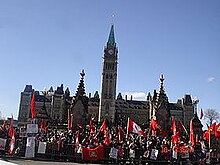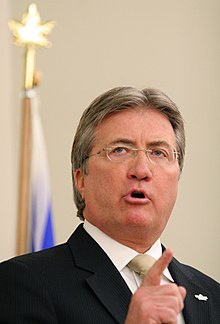Portal:Canada
| Showcase | Contents | Contributing |
Introduction
Canada is a country in North America. Its ten provinces and three territories extend from the Atlantic Ocean to the Pacific Ocean and northward into the Arctic Ocean, making it the world's second-largest country by total area, with the world's longest coastline. Its border with the United States is the world's longest international land border. The country is characterized by a wide range of both meteorologic and geological regions. With a population of just over 41 million people, it has widely varying population densities, with the majority residing in urban areas and large areas of the country being sparsely populated. Canada's capital is Ottawa and its three largest metropolitan areas are Toronto, Montreal, and Vancouver.
Canada is a parliamentary democracy and a constitutional monarchy in the Westminster tradition. The country's head of government is the prime minister, who holds office by virtue of their ability to command the confidence of the elected House of Commons and is appointed by the governor general, representing the monarch of Canada, the ceremonial head of state. The country is a Commonwealth realm and is officially bilingual (English and French) in the federal jurisdiction. It is very highly ranked in international measurements of government transparency, quality of life, economic competitiveness, innovation, education and human rights. It is one of the world's most ethnically diverse and multicultural nations, the product of large-scale immigration. Canada's long and complex relationship with the United States has had a significant impact on its history, economy, and culture.
A developed country, Canada has a high nominal per capita income globally and its advanced economy ranks among the largest in the world, relying chiefly upon its abundant natural resources and well-developed international trade networks. Recognized as a middle power, Canada's strong support for multilateralism and internationalism has been closely related to its foreign relations policies of peacekeeping and aid for developing countries. Canada is part of multiple international organizations and forums. (Full article...)
Featured article -
Protests in Canada against the Sri Lankan Civil War, often referred to as the Tamil protests by the media, consisted of a series of demonstrations which took place in major Canadian cities with a significant Tamil diaspora population during the year 2009 protesting the alleged genocide of Sri Lankan Tamil people in the Northern Province and Eastern Province of the island nation Sri Lanka. It was part of a global outcry by the Tamil diaspora to end the Sri Lankan Civil War, investigate acts of war crimes by the Government of Sri Lanka, and restore civil rights for Tamils in Sri Lanka. The aim was also to create awareness and appeal to leaders, notably the Prime Minister of Canada, Stephen Harper, the President of the United States, Barack Obama and the Consulate General of Sri Lanka in Canada, Bandula Jayasekara, to take action in ending the conflict. Several Tamil Canadian citizens and business owners from different parts of Canada and the United States took part in major protests set up in Toronto and Ottawa, while smaller scale demonstrations took place in Montreal, Vancouver and Calgary. (Full article...)
Featured biography -
Daniel E. Williams KC (born August 4, 1949) is a Canadian politician, businessman, and lawyer who served as the ninth premier of Newfoundland and Labrador between November 6, 2003, and December 3, 2010. (Full article...)
Selected panorama -
National symbol -
Maple syrup is a syrup made from the sap of maple trees. In cold climates, these trees store starch in their trunks and roots before winter; the starch is then converted to sugar that rises in the sap in late winter and early spring. Maple trees are tapped by drilling holes into their trunks and collecting the sap, which is processed by heating to evaporate much of the water, leaving the concentrated syrup. (Full article...)
Selected vital article -

The prime minister of Canada (French: premier ministre du Canada) is the head of government of Canada. Under the Westminster system, the prime minister governs with the confidence of a majority of the elected House of Commons; as such, the prime minister typically sits as a member of Parliament (MP) and leads the largest party or a coalition of parties. As first minister, the prime minister selects ministers to form the Cabinet. (Full article...)
Selected picture -
Current events
- November 15, 2024 –
- The Canadian Union of Postal Workers go on strike after failing to renegotiate their contract with Canada Post. (AP)
- October 25, 2024 –
- A man fatally shoots two of his family members before killing himself in Huntsville, Ontario, Canada. (CTV News Barrie)
- Ontario Premier Doug Ford's government announces that Ontario is planning to ban international students from medical schools in the province beginning in 2026. (Pelham Today)
- October 24, 2024 –
- Four people are killed and one other is seriously injured when a Tesla car crashes into a guardrail and struck a concrete pillar at high speed after losing control causing a fire in Toronto, Canada. (CTV News Toronto)
- October 15, 2024 –
- The Palestinian Prisoner Solidarity Network is designated as a terrorist group by the Canadian government and is sanctioned by the U.S. government, due to the group's alleged ties to the Popular Front for the Liberation of Palestine. (CTV News)
- October 10, 2024 – Russian invasion of Ukraine
- The World Bank approves a new financial intermediary fund consisting of grants from the United States, Japan, Canada, and other countries coupled with interest from frozen Russian assets to give to Ukraine as part of a $50 billion loan. (Reuters)
Did you know -

- ... that Irene Parlby was one of The Famous Five, a group of women in Canada who fought for the right of women to be considered "persons"?
- ... that there's a Little Canada on Minnesota State Highway 36?
- ... that Chinese-Canadian Zhuo Qun Song is currently the most decorated International Mathematical Olympiad contestant?
- ... that research conducted in 2020 found that squirrels are "nearly ubiquitous" on college campuses in the United States and Canada?
- ... that Canadian photographer and architectural activist Brian Merrett's works prompted the preservation of Montreal's Shaughnessy House, now the Canadian Centre for Architecture?
- ... that Annalee Newitz chose to set their debut novel Autonomous in the Canadian prairies because it was "the kind of place that often gets forgotten"?
- ... that to convince Canadian regulators that Vancouver could support a new ethnic radio station, the founder of CJVB documented local restaurants and Sikh temples?
Featured list -
The Supreme Court of Canada is the highest court of Canada. It was established by the Parliament of Canada through the Supreme and Exchequer Court Act of 1875. Since 1949, the Court has been the final court of appeal in the Canadian justice system. Originally composed of six justices (the Chief Justice of Canada and five puisne justices), the Court was expanded to seven justices by the creation of an additional puisne justice position in 1927, and then to nine justices by the creation of two more puisne justice positions in 1949. (Full article...)
Main articles
Associated Wikimedia
The following Wikimedia Foundation sister projects provide more on this subject:
-
Commons
Free media repository -
Wikibooks
Free textbooks and manuals -
Wikidata
Free knowledge base -
Wikinews
Free-content news -
Wikiquote
Collection of quotations -
Wikisource
Free-content library -
Wikiversity
Free learning tools -
Wikivoyage
Free travel guide -
Wiktionary
Dictionary and thesaurus
































